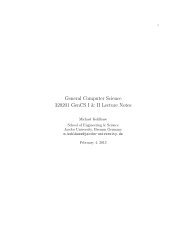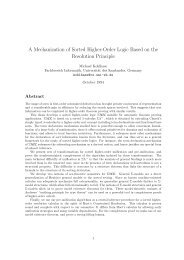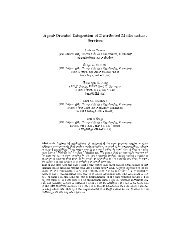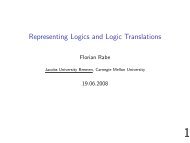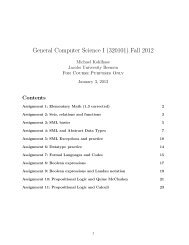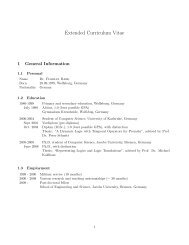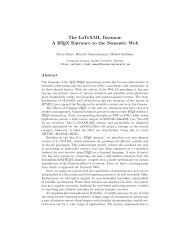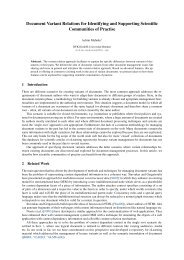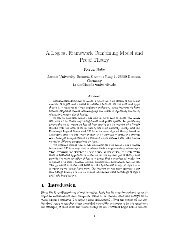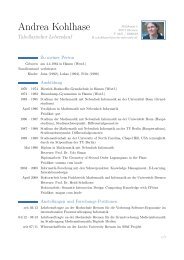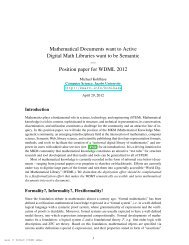General Computer Science; Problems and Solutions for ... - Kwarc
General Computer Science; Problems and Solutions for ... - Kwarc
General Computer Science; Problems and Solutions for ... - Kwarc
Create successful ePaper yourself
Turn your PDF publications into a flip-book with our unique Google optimized e-Paper software.
Problem 1.38 (Substitution Application)<br />
Consider the following SML data type of terms:<br />
datatype term = const of string<br />
| var of string<br />
| pair of term * term<br />
| appl of string * term<br />
Constants <strong>and</strong> variables are represented by a constructor taking their name string, whereas applications<br />
of the <strong>for</strong>m f(t) are constructed from the name string <strong>and</strong> the argument. Remember<br />
that we use f(a, b) as an abbreviation <strong>for</strong> f(〈a, b〉). Thus a term f(a, g(x)) is represented as<br />
appl("f",pair(const("a"), appl("g", var("x")))).<br />
With this, we can represent substitutions as lists of elementary substitutions, which are pairs<br />
of type term * string. Thus we can set<br />
type subst = term * string list<br />
<strong>and</strong> represent a substitution σ = [(f(a))/x], [b/y] as [(appl("f", const("a")), "x"), (const("b"), "y")].<br />
Of course we may not allow ambiguous substitutions which contain duplicate strings.<br />
Write an SML function substApply <strong>for</strong> the substitution application operation, i.e. substApply<br />
takes a substitution σ <strong>and</strong> a term A as arguments <strong>and</strong> returns the term σ(A) if σ is unambiguous<br />
<strong>and</strong> raises an exception otherwise.<br />
Make sure that your function applies substitutions in a parallel way, i.e. that [y/x], [x/z](f(z)) =<br />
f(x).<br />
Solution:<br />
exception ambiguous_substitution<br />
local<br />
fun sa(s,const(str)) = const(str)<br />
| sa(s,pair(t1,t2)) = pair(sa(s,t1),sa(s,t2))<br />
| sa(s,appl(fs,t1)) = appl(fs,sa(s,t1))<br />
| sa(nil,var(str)) = var(str)<br />
| sa((t,x)::L,var(str)) = if str = x then t else sa(L,var(str))<br />
fun ambiguous = ...<br />
in<br />
fun substApply (s,t) = if ambiguous(s)<br />
then raise ambiguous_substitution<br />
else sa(s,t)<br />
end<br />
or<br />
(* (C) by Anna Michalska *)<br />
datatype term = const of string<br />
| var of string<br />
| pair of term * term<br />
| appl of string * term;<br />
type subst = (term * string) list;<br />
exception ania;<br />
fun comparing1 ((x1,x2), []) = true | comparing1 ((x1,x2), hd::tl) = if<br />
hd=x2 then false else comparing1 ((x1,x2),tl);<br />
fun comparing2([],_)=true | comparing2 ((x3,x4)::t,tl) = if (comparing1<br />
((x3,x4),tl)) then comparing2 (t,x4::tl) else raise ania;<br />
fun tab (a,[]) = var(a)<br />
| tab (a, (a1,a2)::tl) = if (a=a2) then a1 else tab(a,tl);<br />
fun substApply_r (appl(a,b),subst_in) = appl(a,substApply_r(b,subst_in))<br />
|substApply_r (pair(a,b),subst_in) =<br />
pair(substApply_r(a,subst_in),substApply_r(b,subst_in))<br />
|substApply_r (var(a),subst_in) = tab(a,subst_in)<br />
|substApply_r (const(x),subst_in) = const(x);<br />
39<br />
30pt



